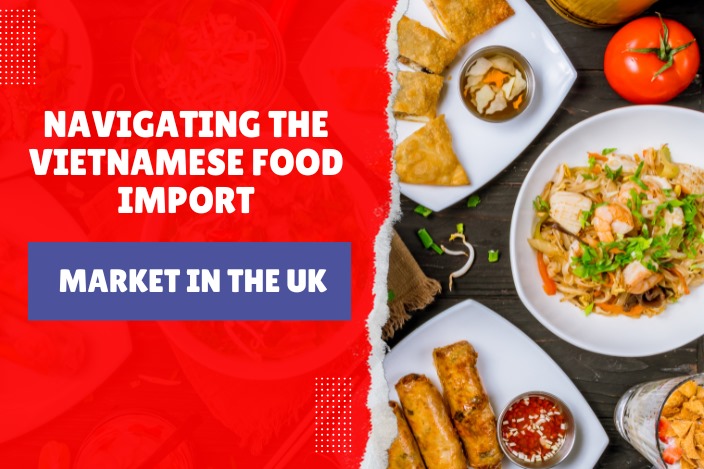
Navigating the Vietnamese Food Import Market in the UK
The demand for authentic Vietnamese flavours has been rising throughout the UK, the food import market has evolved to meet the ever-growing demand. Vietnamese cuisine is gaining popularity with its fresh ingredients, bold flavours, and healthy dishes. However, importing Vietnamese food to the UK comes with several challenges. Here’s a simple guide to understanding the Vietnamese food import market.
Why Vietnamese Cuisine is Growing in the UK
Famous for its balanced flavours and fresh ingredients, Vietnamese food is also known for its high-quality rice noodles, herbs, spices, and sauces, which showcase a wide range of tastes. With the increasing demand for Vietnamese cuisine, there are visible opportunities for Vietnamese food importers to bring in more authentic ingredients for restaurants, grocery stores, and food businesses across the UK.
Key Things to Know When Importing Vietnamese Food
Importing Vietnamese food to the UK involves a few important steps. Here are some key points to keep in mind:
Finding Quality Suppliers
Sourcing products from reliable suppliers in Vietnam is essential to deliver quality. British customers want authentic ingredients, so selecting items like rice noodles, fish sauce, and spices from trusted sources is important. Working with an experienced Vietnamese food distributor can make this process easier.
Following Import Rules
Importing food requires meeting UK regulations on food safety, labelling, and packaging. These regulations can be strict, so understanding and following them is essential to avoid delays. An established oriental food importer in the UK can help guide you through these rules.
Building a Strong Distribution Network
A good distribution plan is essential for getting Vietnamese ingredients into the UK market. Connecting with ethnic food distributors and wholesalers can help you reach local businesses, supermarkets, and food markets more easily.
Using Wholesale to Expand
Working with oriental food wholesalers like JK Foods UK allows you to reach more businesses quickly. Wholesale suppliers play a key role in helping Vietnamese food products get into various outlets, including restaurants, local shops, and supermarkets.
Staying Competitive in the B2B Market
Competition is high among B2B food importers. Staying competitive means focusing on quality, reliable delivery, and fair pricing. It’s also important to keep up with food trends, such as sustainable packaging and locally preferred products, to stand out in the market.
Common Challenges in the Vietnamese Food Market
The Vietnamese food market in the UK is full of opportunities, but it also has its challenges:
Logistics and Delivery
Managing the supply chain, especially with international shipping, can be tricky. Partnering with experienced oriental food distributors such as JK Foods UK can help streamline the process.
Market Competition
With other Asian cuisines, like Japanese and Korean, gaining popularity, staying relevant can be challenging. Working with wholesalers who know the market can provide useful insights on maintaining a strong position.
Adapting to Local Tastes
Some Vietnamese ingredients may need slight changes in packaging or recipe suggestions to appeal to British consumers. Understanding the local market can help with adapting to these needs.
Tips for Success in the Vietnamese Food Market
To grow as a Vietnamese food importer in the UK, here are some practical tips:
Educate Your Market
Helping customers and businesses understand Vietnamese flavours and dishes can build interest. Consider sharing recipe ideas or cooking tips to make these products approachable.
Offer a Variety of Products
Vietnamese cuisine includes a wide range of items, from sauces and noodles to herbs and spices. Providing a diverse selection allows businesses to meet the growing interest in authentic dishes.
Use Digital Marketing
Promoting your products on social media and online can help reach a wider audience. Share details on sourcing and highlight popular Vietnamese ingredients to build trust and attract customers.
Conclusion
The Vietnamese food import market in the UK holds exciting potential as interest in Asian cuisine continues to grow. By focusing on quality sourcing, building good distribution networks, and adapting to local needs, importers can make the most of this opportunity. Reliable oriental food wholesalers and Vietnamese food distributors like JK Foods UK, a leading distributor of Vietnamese cuisine, play a vital role in bringing fresh, authentic flavours to the UK market, helping businesses meet the rising demand for genuine Vietnamese ingredients.
